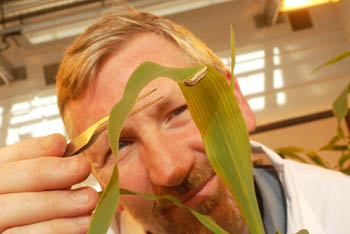Halting armyworm rampage with biological pesticide

Lancaster University scientists are investigating a naturally occurring virus which could cut down the African Armyworm population, preventing crop damage in the developing world.
Like locusts, the African armyworm is a major migratory insect pest in Africa. Eggs laid by African armyworm moths hatch into extremely dense swarms of caterpillars which feed voraciously on cereal crops. Up to 70 per cent of farmers across Africa suffer from crop damage and loss caused by armyworms.
Outbreaks occur in most years and spread across much of Africa.
Currently the only way to control these outbreaks is by spraying with chemical insecticides, but these are too expensive for most farmers and can damage the environment. Using a radical new solution, researchers from the UK, Canada and Tanzania will investigate the use of a naturally occurring virus in armyworms - armyworm nucleopolyhedrovirus (NPV).
NPV is a highly specific virus, harmless to humans and other wildlife, but in most years the virus appears too late to prevent armyworms from causing serious crop damage.
This new project funded by Sustainable Agriculture Research for International Development (SARID) will study the detailed biology of NPV with a plan to harness it as a biological pesticide to prevent the early spread of armyworms and the resulting loss in crops.
It is a collaboration between Lancaster University; Natural Resources Institute, Greenwich; Laurentian University, Canada; and Sokoine University of Agriculture, Tanzania
The research forms part of a new £7M research programme tackling some of the most damaging and widespread pests, diseases and harsh environmental conditions which can devastate crop yields across the developing world.
The Biotechnology and Biological Sciences Research Council (BBSRC) and the Department for International Development (DFID) are unveiling 12 new projects as part of their flagship SARID initiative - to harness the UK’s world class bioscience research base to address the challenges of agriculture and food security in developing countries.
The new projects will look at how a variety of crops – from maize to coconuts, rice to bananas – respond at a molecular level to hostile factors including attack by pests and diseases as well as inclement conditions. Their findings will offer new and exciting opportunities to develop crops better able to survive and thrive in their changing environments. Such advances in crop science could revolutionise the way farmers are able to farm across the developing world and have a significant impact on reducing poverty.